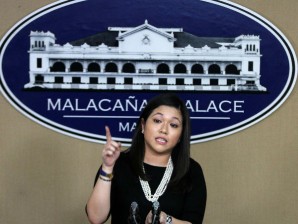MANILA, Philippines—The Aquino administration has described 2013 as “a year of challenges” despite the economy posting “some of the highest growth numbers in Asia.”
In its yearend report posted on gov.ph/featured/2013-yearend/, Malacañang said it was during the year that “our collective commitment to persevere and to stand shoulder to shoulder enabled us to overcome the trials set before us, thus making the world admire and respect us all the more.”
The report talked about a “remarkable year for the Filipino people—one in which the President showed his indomitable will to lead the nation forward, and where the mandate for change was renewed in the midterm elections.”
Deputy presidential spokesperson Abigail Valte said the infographics posted on the online Official Gazette showcased the country’s successes—from spurring economic growth, expanding social services, enhancing peace and security, combating corruption and instituting greater reform in government, as well as ensuring that “our countrymen rise from the rubble of man-made and natural calamities.”
Challenging year
“It has been a year of challenges not only for the administration but also for the Filipino people,” said Valte in an interview over state-run Radyo ng Bayan.
“It has been a year wherein the foresight and prudence of the President and his team— holding fast to the long-term vision of a more prosperous, stable and dynamically competitive Philippines—has been upheld time and again,” she said.
The infographics she was referring to were prepared by the Presidential Communications Development and Strategic Planning Office, and the Office of the Presidential Spokesperson.
“Our achievements only tell us that nothing is impossible for the Filipino people,” she said, adding:
“As the infographics put it: ‘As a nation with collective aspiration, we have many successes despite the overlapping trials we have been through. Truly: The Filipino will never succumb to any trial.’”
Asia’s rising star
Malacañang’s yearend report said the economy in 2013 “continued its stellar performance, posting some of the highest growth numbers in Asia.”
It cited the successive credit upgrades the country obtained from the three major credit rating agencies—Baa3+ from Moody’s Investors Service; BBB-stable from Standard & Poor’s; and BBB-stable from Fitch Rating—the Philippine Stock Exchange Index that reached 7,392.20 on May 15 and total approved investments worth P126.5 billion.
In government spending, it noted a 14.58-percent increase in infrastructure spending, from P257.22 billion in 2012 to P294.71 billion in 2013.
The economy posted five consecutive quarters of at least 7 percent gross domestic product (GDP) growth, “buoyed by the expansion in consumer spending, higher business and consumer confidence, favorable interest rates, stable inflation, strong inflows of overseas Filipino remittances, high inbound tourism, and an optimistic domestic economic outlook.”
For the first three quarters of the year, GDP grew above the government’s target of 6-7 percent.
The report cited Moody’s Analytics description of the country as “Asia’s rising star,” and noted that the World Bank’s “Doing Business Report” ranked the country 108th, a jump of 30 notches from 2012.
Sultan of Sulu
The country experienced some of the worst manmade and natural calamities this year.
The challenges to the Aquino administration began in February, when over 200 armed followers of the late Sultan Jamalul Kiram III engaged Malaysian forces in a two-week battle to reclaim Sabah.
The standoff claimed the lives of 68 Filipinos and 10 Malaysian security personnel, and clouded relations between Manila and Kuala Lumpur.
According to the yearend report, 3,513 e-passports had been processed for “displaced (Filipino) persons and deportees” as of November 2013.
“Qualified displaced persons from Sabah were enrolled under the modified conditional cash transfer program,” it noted.
The three-week Zamboanga standoff in September led by followers of Moro National Liberation Front (MNLF) founder Nur Misuari, who is now in hiding, cost taxpayers P3.5 billion for recovery and reconstruction efforts.
Back-to-back natural calamities started with Typhoon “Santi” which pummeled Luzon in October, followed by the magnitude-7.2 earthquake that struck Bohol in the same month.
In November, Supertyphoon “Yolanda,” the strongest typhoon to hit land, lashed Central Philippines.
Total relief assistance from the social welfare department, local government units and nongovernment organizations reached P36.50 million for Santi alone, according to the report.
The government, this year, spent for the rehabilitation of areas hit by Typhoons “Pablo”— P1.06 billion for rehabilitation and rebuilding of infrastructure damaged in December 2012— and “Sendong” which hit Norther Mindanao, the Visayas and Palawan in December 2011.
No figure was cited for reconstruction efforts after Sendong, except for “an emergency employment livelihood recovery and reconstruction project” in which “qualified beneficiaries were paid a daily wage of P215, or 75 percent of the approved minimum wage for the city.”
Mr. Aquino said his administration needed P130 billion for recovery and rehabilitation of areas devastated by Yolanda.
Social services, security
For social welfare, the administration expanded and improved health care, education and social services through conditional cash transfer (3.9 million households), PhilHealth insurance (77.86 million members), improvement of health facilities (P33 billion), sustainable livelihood program (316,426 households), classroom construction (62,336 rooms), Kapit-Bisig Laban sa Kahirapan-Comprehensive and Integrated Delivery of Social Services, the Sajahatra Bangsamoro Study Grant Program, and strengthened child trafficking drive.
The government and the Moro Islamic Liberation Front peace negotiation panels approved this year the three annexes to the 2012 Bangsamoro Accord: On transitional arrangement and modalities, revenue-generation and wealth-sharing, and power-sharing.
RELATED STORIES:
Sulu sultan decries alleged Palace extradition plan
Gov’t to fix flooding in Metro by yearend
Palace tells off Nur: You’re no DiCaprio
